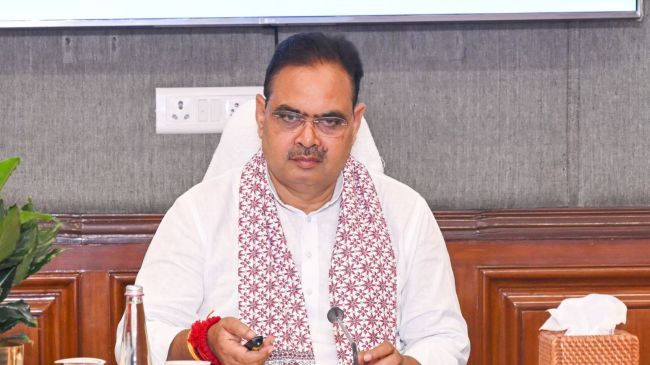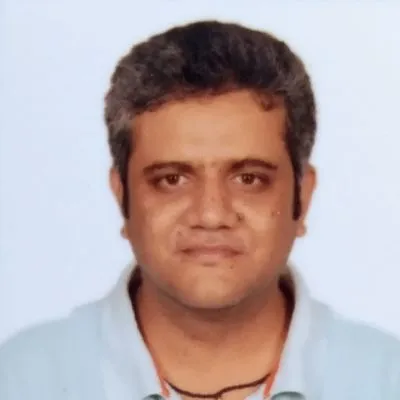Rajasthan CM: ‘Our use of bulldozers has been lawful … Unlike perceptions of arbitrary demolitions, our approach ensures due process’
“The learning curve (as CM) has been steep but rewarding … While there have been occasional challenges in aligning priorities, a collaborative spirit in the party and the administration has enabled us to deliver on key promises,” says Bhajan Lal Sharma
 Praising the BJP government in the state, led by Chief Minister Bhajan Lal Sharma, Modi said, “Our government is working to heal the wounds inflicted by Congress’s looting of Rajasthan. Under the Congress government, Rajasthan had become a centre of paper leaks."(Express photo)
Praising the BJP government in the state, led by Chief Minister Bhajan Lal Sharma, Modi said, “Our government is working to heal the wounds inflicted by Congress’s looting of Rajasthan. Under the Congress government, Rajasthan had become a centre of paper leaks."(Express photo) A first-time MLA who was given the responsibility of governing Rajasthan after the BJP came to power in 2023, Chief Minister Bhajan Lal Sharma admits that the “learning curve has been steep”. In an interview with The Indian Express, the Rajasthan CM discusses what he has learnt on the job so far, his government’s achievements, what it is doing to promote job creation, and bulldozer actions. Excerpts:
* What it was like in Rajasthan during the conflict with Pakistan last month. It came under attack …
Following the Pahalgam attack, Rajasthan was on high alert. My government coordinated with the Union Home Ministry and the defence forces to ensure heightened vigilance along the border districts of Jaisalmer, Barmer and Sri Ganganagar. We bolstered police deployment to assist central forces, conducted joint mock drills as a part of Operation Shield alongside Punjab and Jammu and Kashmir, and ensured logistical support for security operations.
* You have been the CM for over a year now. What have been your biggest learnings?
The learning curve has been steep but rewarding, particularly in understanding the intricacies of policy implementation and stakeholder coordination. I have been fortunate to receive substantial cooperation from party leaders and the guidance of senior leaders such as Prime Minister Narendra Modi, Union Home Minister Amit Shah, and party chief J P Nadda. They have been instrumental in shaping my approach to governance.
While there have been occasional challenges in aligning priorities, the collaborative spirit in the party and the administration has enabled us to deliver on key promises like infrastructure development and social welfare.
* If you had to list your administration’s achievements so far, what would you mention?
In our first year, we fulfilled nearly half the promises made in the 2023 manifesto, including law and order and anti-corruption measures. The Rising Rajasthan Investment Summit, securing Rs 35 lakh crore in MoUs, is a landmark initiative to drive economic growth. Additionally, restoring pensions for those jailed under the Maintenance of Internal Security Act (MISA) during Emergency reflects our commitment to honouring historical sacrifices.
The new schemes we have implemented include the provision of cooking gas cylinders at Rs 450 for 72.83 lakh Ujjwala Yojana beneficiaries, significantly easing the financial burden on low-income households. We have also launched the Rajasthan Investment Promotion Scheme 2024, offering incentives to attract industries, and the Mukhyamantri Vishwakarma Pension Scheme, providing financial security to artisans. These initiatives underscore our focus on inclusive development and economic empowerment.
* People have compared bulldozer actions in Rajasthan to the “UP model” …
The use of bulldozers in Rajasthan, particularly in cases linked to the paper leak scandal going back several years, has been a targeted and lawful response to criminal activities. For instance, the demolition of a coaching institute in Jaipur run by individuals accused of leaking the paper of the second-grade teacher recruitment examination was carried out as per legal provisions to send a strong message of deterrence.
However, I must clarify that the media is referring to these actions as the “UP model”. Each state operates within its unique context to protect the public interest. Unlike perceptions of arbitrary demolitions, our approach ensures due process, targeting only those properties directly linked to criminal enterprises.
* The Centre has decided to conduct caste enumeration along with the next Census. What are your views on it?
I fully endorse the Centre’s initiative of conducting a caste census as it aligns with the ethos of bringing marginalised and deprived communities into the mainstream. As highlighted during the NDA CMs’ conclave, the caste census is about ensuring that the marginalised communities are prioritised in development schemes.
* The BJP president’s election has been delayed by almost a year now. Why?
As a disciplined member of the party, I respect the internal democratic processes that guide our organisation. I trust the central leadership’s judgement in determining the appropriate timing (of electing the president). The BJP remains a democratic party as evidenced by its transparent processes of electing leaders at various levels.
* What impact do you expect the recently launched Vande Ganga Mission to have on the state?
I launched the 15-day “Vande Ganga Jal Sanrakshan-Jan Abhiyan” on June 5 to coincide with Ganga Dussehra and World Environment Day. The campaign is aimed at creating awareness and combating water scarcity across the state’s 41 districts.
With Rs 345 crore allocated, the campaign involves shramdaan (voluntary contribution of labour), cleaning hundreds of water bodies, and Vande Ganga Kalash Yatra, benefiting 45,000 villages. The Vande Ganga Mission, inspired by the national vision to rejuvenate India’s rivers, aims to restore and preserve Rajasthan’s water bodies, particularly focusing on sustainable water management in our arid state.
The broader Vande Ganga Mission rejuvenates rivers and canals, enhancing irrigation for 2.8 lakh hectares, bolstering agriculture (60% workforce), and ensuring sustainable water security, reducing migration, and promoting rural development.
* What is your government’s strategy to promote economic growth and job creation?
The Rising Rajasthan Investment Summit is expected to generate over 10 lakh direct and indirect jobs. We have launched the Rajasthan Investment Promotion Scheme 2024, offering tax incentives to attract industries, particularly in the industries of the future like IT and manufacturing.
For the youth, we have prioritised skill development, training 50,000 individuals in 2024 through the Rajasthan Skill and Livelihoods Development Corporation. In the 2025-26 financial year, we plan to hire 1.25 lakh youth in government jobs. These initiatives aim to empower our youth with opportunities in a rapidly growing economy.
* Can you tell us about the steps being taken to strengthen border security?
Rajasthan’s border with Pakistan demands robust security measures, as highlighted by Operation Sindoor. We have enhanced coordination with the Border Security Force, increasing patrols and deploying advanced surveillance systems, including drones and thermal cameras, along the 1,070-km border. Community engagement programmes ensure local cooperation, while infrastructure development, like all-weather roads, improves rapid response capabilities. These measures aim to secure our borders and ensure peace in the region






